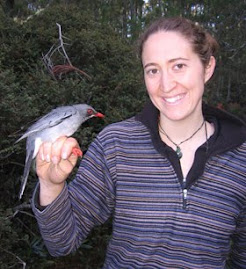So do I talk about the Fray concert last Saturday, cross-country skiing in the Snowy Range on Sunday, what it's like to be on the search committee for a new Conservation Biology professor, rock climbing at the Half-Acre gym, or my (bird-focused) winter break plans in Hispaniola?
 Or I could talk about some of the really interesting things I've discovered in researching the history of bird migration theory for Ecology 5100, the first of two PiE required classes. I hope all those other bird nerds out there heard about the first documented migratory double breeding in Mexico--researchers found five migratory bird species that breed in northern North America, migrate to the west coast of Mexico and breed a second time, and then migrate farther south to the tropics to spend the winter (Rohwer et al. 2009). Migration research is expanding so rapidly right now, it's hard to keep up!
Or I could talk about some of the really interesting things I've discovered in researching the history of bird migration theory for Ecology 5100, the first of two PiE required classes. I hope all those other bird nerds out there heard about the first documented migratory double breeding in Mexico--researchers found five migratory bird species that breed in northern North America, migrate to the west coast of Mexico and breed a second time, and then migrate farther south to the tropics to spend the winter (Rohwer et al. 2009). Migration research is expanding so rapidly right now, it's hard to keep up!The current issue of Conservation Biology has the last regular editorial by David Orr (who's written 63 columns over the last 21 years) , which I think provides a good outlook on the future of conservation and sets the tone for my future blog entries, so I'll end with this:
"...21 years ago it would have been difficult to plausibly imagine the scope, scale, and rising intensity of the global movement to build a decent, fair, and sustainable world. The resilience of the human spirit in difficult times is the news of our age. It is evident in the pages of this journal and in the rising tide of science dedicated to issues of human and ecological health. But it is also manifested in the rising chorus of voices of people worldwide working on natural-systems agriculture, green building, biomimicry, community forestry, urban renewal, green business, renewable energy, wilderness and land preservation, and peace. Paul Hawken calls this "blessed unrest" and likens it to a planetary immune system. Perhaps. But something is clearly stirring worldwide and it is our privilege to be a small part of what our descendents may someday recognize as humankind's finest hour when conservation of biological diversity, land, people, and prospects became irreversible and irrevocable." -David Orr

